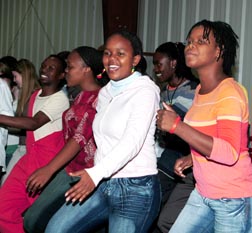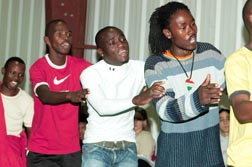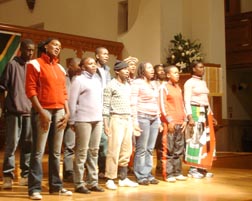 An Approach That Works
An Approach That Works
Bokamoso, which means "future", was started by the Anglican Diocese of Pretoria’s Mission for Community Development in 1999 after a series of precipitating incidents. During an armed hi-jacking, one of Tumelong’s health workers was shot, a family was tied up for two hours during an armed robbery, another health care worker and a young girl were raped. These crimes had been perpetrated by youth between the ages of 14 and 21. Local police station statistics confirmed that most crimes committed in the community were carried out by youth.
Winterveld, a sprawling informal settlement, full of poverty,  unemployment, and broken families, was such a hotbed for crime that it was known as "Maslagpan" or slaughterhouse. Too many families could not afford school fees for their children. Consequently, many youth stayed home, were hungry, without money, with nothing to do. Crime was an attractive alternative.
unemployment, and broken families, was such a hotbed for crime that it was known as "Maslagpan" or slaughterhouse. Too many families could not afford school fees for their children. Consequently, many youth stayed home, were hungry, without money, with nothing to do. Crime was an attractive alternative.
Learning of a successful program for at-risk youth in another part of the country, Tumelong sent (Youth Centre developers) Rosina and Soli to learn and receive training from them. They brought back the basic components of the Bokamoso program.
It begins with recruiting and referrals. Soli, a key figure in the community because his father was a local healer, identifies youth who might benefit and invites them to the program. Some youth, in trouble with the law, ask to be referred. Parents contact Bokamoso and ask for a place for their child. Social workers and magistrates also send youth to the program.
About 25 youth are accepted for each of the three intake sessions per year. Once enrolled, youth are assessed. Staff meet the parents, learn the background of the child, and establish relationships with the youth and the parents.
The program, designed to give youth a second chance by developing empowering skills and attitudes, is three-pronged: the Adolescent Development Program (ADP), a 12-week life skills course; Occupational Skills Training (provided by the Sisters of Mercy) which enables the youth to become self-supporting if they are not returning to mainstream schools or entering the labor market; Intensive Family Support which offers continued counseling until the young person is firmly established.
Many young people in Winterveld sleep around and forget about sexually transmitted diseases. Rosina and other staff members inform them about HIV/AIDS. "If you don’t care for your body, you can’t achieve your goals," she reminds them. Roy Barber, drama and music teacher at St. Andrews School in Wheaton Md and member of Seekers Church has visited Bokamoso. With the young people, he created an AIDS awareness play called "It Can’t Happen to Me". Polishing this play to performance level and then offering it in schools and churches in Winterveld as well as now here in the United States has been a terrific morale builder for everyone at Bokamoso.
Article exerpt by Jackie McMakin for Faith@Work magazine
The Bokamoso youth need all types of help and sizes of contributions. For every $1500 raised, one young adult can be sent to vocational training or college for one year. A bargain! To contribute, write Bokamoso Scholarship Fund on the memo line of checks and mail to:
Seekers Church
Attn: Treasurer
276 Carroll St. NW
Washington DC 20012
Contributions are tax deductible and make wonderful “alternative gifts” to honor family and friends. Simply ask for a gift card.